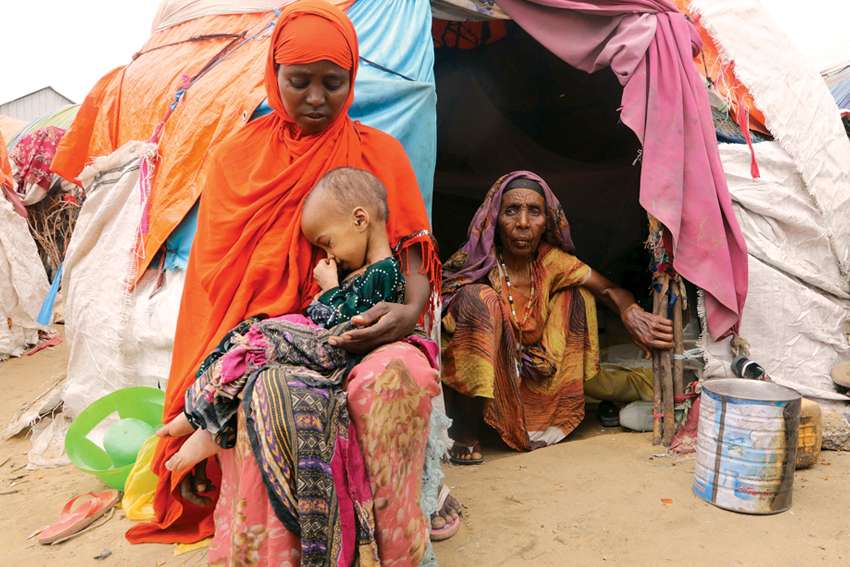What is a stabilization centre? It is a place that provides health and nutrition services for people suffering from severe malnutrition, especially lactating mothers and infant children. Demand for the services they offer is rising quickly, threatening to overwhelm those who provide them.
Development & Peace – Caritas Canada sounded the alarm bells on the crisis in Somalia with other partner organizations in October, in a special message on World Food Day. Dr. Tar Abdi Tari Ali, who works for our Trocaire partner in Somalia, said, “More than a million Somalis have had to leave their homes because of the prolonged drought. They would have struggled with feeding their families even if food prices had stayed the same. Last year, families needed approximately $55 a month for food. Now with the price of food and clean water skyrocketing, they need more than $150. What are these families to do now?”
As Christmas approaches, even mainstream news outlets are now starting to take note.
For five consecutive seasons the rains have failed to come to Somalia. Coupled with the effects of local and international armed conflicts, seven million people are at risk of hunger and an estimated 1.5 million children face acute malnourishment.
In our work there are all kinds of technical definitions when it comes to a hunger crisis. Something called the IPC (Integrated Food Security Phase Classification) is used to answer questions like, “when can we call it a famine?” The aim is to prevent any situation from becoming a famine, as happened in 2011 when 250,000 people died in the country. However, as Paul Healy, the country director for our partner Trócaire, told the CBC, “If you’re arguing about whether it’s famine or not, you’re already too late and people are dying.”
Trócaire’s work is focused on the Gedo region of Somalia, where 265,000 internally displaced people are to be found. It provides displaced people and host communities with nutrition services through district hospitals, primary health units and six health centres.
Thanks to funding from the government of Canada we have been able to help Trócaire scale up its work. The project that will address the priority and immediate needs of over 54,000 additional beneficiaries, including over 28,000 children. The services will include the treatment of severe and moderate acute malnutrition for children under five and pregnant and lactating women, as well as food vouchers for the households of children treated for severe acute malnutrition to reduce the risk of relapse.
They say this is the worst drought in the region in 40 years. Around that time, in 1984, “Do they know it’s Christmas?” was written by Bob Geldhof and Midge Ure and was performed by a celebrity cast to raise awareness and funds for the famine in Ethiopia. The song remains a holiday mainstay on the radio and streaming platforms year over year.
It seems that, literally and metaphorically, we will be doomed to sing the same tune repeatedly unless things change. Dr. Abdulaziz Osman, speaking to the CBC from the Dolow stabilization centre said, “We are focusing on treating these children, but if you don’t handle the root causes, the vicious cycle will continue.”
As the global climate crisis intensifies, Dr. Osman’s words ring loud and true. It is for this reason that Development & Peace is not only supporting the immediate effort to prevent a famine in Somalia. We are also supporting long-term local solutions throughout the region to help communities adapt to climate change while recognizing the need to address and change our own economic systems and lifestyle choices that contribute to a warming planet.
If you are looking for where the Christ-child is to be found this Christmas, you will not find him in the stables of Bethlehem. You will find Him in the stabilization centres of Somalia.
(Stocking is Deputy Director of Public Awareness & Engagement, Ontario and Atlantic Regions, for Development and Peace.)


